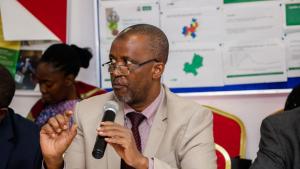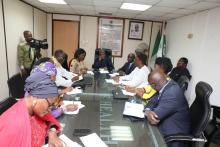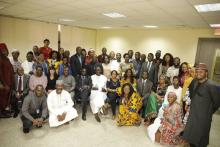Functional Review Team identifies potential areas for repositioning WHO Nigeria towards achieving sustainable national health goals.
Abuja, 19 July, 2019 - The World Health Organization’s (WHO) Africa Region Functional Review Mission has indicated on 19 July, 2019 that Nigeria Country Office can leverage on successes recorded in Polio eradication for greater national public health impact.
Presenting preliminary findings and recommendations to Management and staff at the end of the two weeks mission on 19 July, 2019 the Project Manager, Dr Abdulmimini Usman says, “Nigeria has great potential, in terms of systems and structures to translate its vision on health to reality and WHO can utilize the polio infrastructure for more results in the broader health spectrum”.
According to him, given the support and positive feedback from the government as well as expectations from partners and other stakeholders, the country office stands at the cusp of history to be a model in promoting WHO’s leadership role in health as well as galvanizing, coordinating and implementing essential health interventions towards achievement of universal health coverage. He added that the country’s enormous human and material resources can be mobilized for promoting health, protecting people and serving the vulnerable in Nigeria.
In line with WHO transformation agenda, the WHO Nigeria is currently undergoing an in-depth functional review in a bid to reposition the Nigeria Country office for enhanced service delivery. Nigeria is the 42nd country (out of 47) in the WHO-Africa Region (AFRO) to undergo a similar exercise.
Over the past 11 days (08-18 July), a high level Functional Review Team from the WHO Africa Regional Office (AFRO) and the Bill & Melinda Gates Foundation (BMGF) assessed WHO interventions in the Country Office and Field Offices in the six geopolitical zones. The team also interacted with a wide range of stakeholders including United Nations Agencies, wide spectrum of partners, Civil Society and Non-Governmental Organizations to assess the scope of activities and interventions carried out by the WHO in Nigeria, the organization’s service delivery channels, the delineation of responsibilities and the capabilities the organization requires to charter the organization’s future.
At the end of the first phase of their assignment, members of the review team and WHO Officer in Charge (OiC), Dr Clement Peter held a meeting with the Permanent Secretary at the Federal Ministry of Health, Mr. Alhaji Abdullahi Mashi, who said, “This exercise is similar to a value for money audit conducted by the World Bank recently. The essence is to ensure that resources are being used efficiently for purposes for which they are allocated for.”
While at the FMoH, the Project Manger said, “we are grateful to the Federal and State Ministries of Health for the support they have accorded WHO so far in the execution of its activities. He added that “The functional review is a huge data-gathering exercise for us and we have received a lot of information on how best to reposition WHO in Nigeria in order to serve the country’s needs”.
Dr Usman further said that based on preliminary findings and for Nigeria to be on track towards achieving health related Sustainable Development Goals, a lot needs to be done in terms of coordination of inputs, resource allocation as well as monitoring and evaluation of projects. In addition, he noted that there is a lot more WHO can do in Nigeria. He specifically highlighted possible areas of collaboration in promoting health insurance schemes and improvements of access to the Basic Healthcare Package. He additionally noted that advocacy; monitoring of trends; strengthening health systems; fighting communicable and non-communicable diseases and improvement of outcomes in maternal and child health care interventions are major areas that should be addressed collaboratively with national health authorities.
The overarching goal of the functional review in Nigeria is to analyse WHO’s core functions within the health sector. The review will also help in: translation of strategic priorities into organizational structure, requirements and demand components (priority functions); analysis of demand component and prioritisation of positions from 01-04 levels; desk review, workflow reconstruction and skills inventory of the supply component (current WCO workforce); Gap analysis between demand and supply components and finally matching required functions from functional review against the current workforce.





